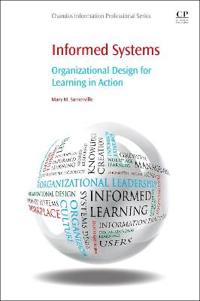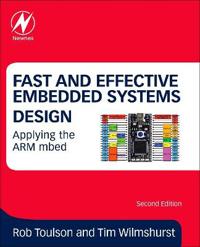The Multibody Systems Approach to Vehicle Dynamics (Häftad)
avSir Michael Blundell
ISBN: 9780080994253 - UTGIVEN: 2014-10Filling the gaps between subjective vehicle assessment, classical vehicle dynamics and computer-based multibody approaches, The Multibody Systems Approach to Vehicle Dynamics offers unique coverage of both the virtual and practical aspects of vehicle dynamics from concept design to system analysis a[...]
The Myth and Magic of Library Systems
ISBN: 9780081000762 - UTGIVEN: 2015-10The Myth and Magic of Library Systems not only defines what library systems are, but also provides guidance on how to run a library systems department. It is aimed at librarians or library administrations tasked with managing, or using, a library systems department. This book focuses on different sc[...]
Estimation of Rare Event Probabilities in Complex Aerospace and Other Systems
ISBN: 9780081000915 - UTGIVEN: 2015-10Rare event probability (10-4 and less) estimation has become a large area of research in the reliability engineering and system safety domains. A significant number of methods have been proposed to reduce the computation burden for the estimation of rare events from advanced sampling approaches to e[...]
Informed Systems
ISBN: 9780081001752 - UTGIVEN: 2015-07By fostering principles of systems thinking and informed learning though an inclusive, participatory design process that advances information exchange, reflective dialogue, and knowledge creation, the Informed Systems Approach promotes conceptual change in workplace organizations. Informed Systems e[...]
Advances in Ground-source Heat Pump Systems
ISBN: 9780081003114 - UTGIVEN: 2016-05Advances in Ground-Source Heat Pump Systems relates the latest information on source heat pumps (GSHPs), the types of heating and/or cooling systems that transfer heat from, or to, the ground, or, less commonly, a body of water. As one of the fastest growing renewable energy technologies, they are a[...]
The Performance of Concentrated Solar Power Systems
ISBN: 9780081004470 - UTGIVEN: 2017-05The Performance of Concentrated Solar Power (CSP) Systems: Analysis, Measurement, and Assessment offers a unique overview of the information on the state-of-the-art of analysis, measurement, and assessment of the performance of concentrated solar power (CSP) components and systems in a comprehensive[...]
Organic Rankine Cycle (ORC) Power Systems
ISBN: 9780081005101 - UTGIVEN: 2016-09Organic Rankine Cycle (ORC) Power Systems: Technologies and Applications provides a systematic and detailed description of organic Rankine cycle technologies and the way they are increasingly of interest for cost-effective sustainable energy generation. Popular applications include cogeneration from[...]
Instrumentation and Control Systems
ISBN: 9780081006139 - UTGIVEN: 2015-08Instrumentation and Control Systems addresses the basic principles of modern instrumentation and control systems, including examples of the latest devices, techniques and applications in a clear and readable style. Unlike the majority of books in this field, only a minimal prior knowledge of mathema[...]
Instrumentation and Control Systems
ISBN: 9780081006214 - UTGIVEN: 2015-08Instrumentation and Control Systems addresses the basic principles of modern instrumentation and control systems, including examples of the latest devices, techniques and applications in a clear and readable style. Unlike the majority of books in this field, only a minimal prior knowledge of mathema[...]
Geological Repository Systems for Safe Disposal of Spent Nuclear Fuels and Radioactive Waste
ISBN: 9780081006429 - UTGIVEN: 2017-06Geological Repository Systems for Safe Disposal of Spent Nuclear Fuels and Radioactive Waste, Second Edition, critically reviews state-of-the-art technologies and scientific methods relating to the implementation of the most effective approaches to the long-term, safe disposition of nuclear waste, a[...]
Fast and Effective Embedded Systems Design
ISBN: 9780081008805 - UTGIVEN: 2016-10Fast and Effective Embedded Systems Design is a fast-moving introduction to embedded systems design, applying the innovative ARM mbed and its web-based development environment. Each chapter introduces a major topic in embedded systems, and proceeds as a series of practical experiments, adopting a "l[...]
Optimization in Renewable Energy Systems (häftad)
ISBN: 9780081010419 - UTGIVEN: 2017-03Optimization in Renewable Energy Systems: Recent Perspectives covers all major areas where optimization techniques have been applied to reduce uncertainty or improve results in renewable energy systems (RES). Production of power with RES is highly variable and unpredictable, leading to the need for[...]
Fault Tolerant Systems (Inbunden)
avIsrael Koren, C. Mani Krishna
ISBN: 9780120885251 - UTGIVEN: 2007-04-13Reflects the challenges faced by designers of fault-tolerant systems. This book addresses fault tolerance design with a systems approach to both hardware and software. It is suitable for students, designers and architects of high performance processors.[...]
Cognitive Systems: Information Processing Meets Brain Science (Inbunden)
avRichard Morris, Lionel Tarassenko, Michael Kenward
ISBN: 9780120885664 - UTGIVEN: 2005-05-01Process Systems Risk Management (Inbunden)
avR. Raman, Ian Cameron
ISBN: 9780121569327 - UTGIVEN: 2005-03-01Covers risk management concepts and applications for safe design and operation of industrial and other process facilities. This work provides relevant techniques to tackle risk management activities for small-, medium- and large-scale operations in process industries. It is a computational perspecti[...]
Numerical Methods for Linear Control Systems: Design and Analysis [With CDROM] (Inbunden)
avBiswa Nath Datta
ISBN: 9780122035906 - UTGIVEN: 2003-12-01Numerical Methods for Linear Control Systems Design and Analysis is an interdisciplinary textbook aimed at systematic descriptions and implementations of numerically-viable algorithms based on well-established, efficient and stable modern numerical linear techniques for mathematical problems arising[...]
Observers In Control Systems (Inbunden)
avGeorge Ellis
ISBN: 9780122374722 - UTGIVEN: 2002-10-24Observers are digital algorithms that combine sensor outputs with knowledge of the system to provide results superior to traditional structures, which rely wholly on sensors. This book uses intuitive discussion, software experiments, and supporting analysis to explain the advantages and disadvantage[...]
Text Information Retrieval Systems (Inbunden)
avCharles T. Meadow, Bert R. Boyce, Donald H. Kraft
ISBN: 9780123694126 - UTGIVEN: 200612This will be the third edition of the highly successful "Text Information Retrieval Systems". The book's purpose is to teach people who will be searching or designing text retrieval systems how the systems work. For designers, it covers problems they will face and reviews currently available solutio[...]
Power Quality in Power Systems and Electrical Machines (Inbunden)
avEwald Fuchs, Mohammad A. S. Masoum
ISBN: 9780123695369 - UTGIVEN: 2008-02-01Helps readers understand power quality problems such as non-sinusoidal wave shapes, voltage outages, origins of single-time events such as voltage dips and voltage reductions. This book offers techniques to mitigate these problems. It provides theoretical and practical insight into power quality pro[...]
Design Of Industrial Information Systems (Inbunden)
avThomas O. Boucher, Ali Yalcin
ISBN: 9780123704924 - UTGIVEN: 2006-12-04Presents a body of knowledge applicable to many aspects of industrial and manufacturing systems. This text provides a background in, and an introduction to, the relevant information technologies and shows how they are used to model and implement integrated IT systems. It introduces Data Modeling and[...]
Transport Phenomena in Multiphase Systems (Inbunden)
ISBN: 9780123706102 - UTGIVEN: 2006-07Engineering students in a wide variety of engineering disciplines from mechanical and chemical to biomedical and materials engineering must master the principles of transport phenomena as an essential tool in analyzing and designing any system or systems wherein momentum, heat and mass are transferr[...]
Agricultural Systems (Inbunden)
avSieglinde S. Snapp, Barry Pound
ISBN: 9780123725172 - UTGIVEN: 2008-03-01With the inclusion of research theory and examples using the principles of cropping system design, students will gain a unique understanding of the technical, biological, ecological, economic and sociological aspects of farming systems science for rural livelihoods. Editors Snapp and Pound provide a[...]
Systems Biomedicine (Inbunden)
avEdison Liu, Douglas A. Lauffenburger
ISBN: 9780123725509 - UTGIVEN: 2009-11-01Systems biology is a critical field that seeks to define the interactions of all biological components by examining underlying biochemical and genetic processes. This title focuses on the applications of systems approaches to medical problems. It reflects the important characteristics of systems str[...]
Systems Science and Modeling for Ecological Economics (Inbunden)
avAlexey Voinov
ISBN: 9780123725837 - UTGIVEN: 2008-07-01Modeling is a key component to sciences from mathematics to life science, including environmental and ecological studies. This book shows how models can be analyzed using simple math and software to generate meaningful qualitative descriptions of system dynamics.[...]



























